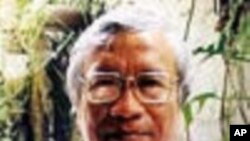Fifteen years ago, the United States Congress designated May 11 as Vietnam Human Rights Day to highlight U.S. support for protecting and promoting basic freedoms in Vietnam.
A ceremony and discussion forum was held today to mark the occasion at the U.S. Capitol, involving members of Congress, labor leaders, non-governmental groups and representatives from Vietnamese communities across America.
The date marks one of the most prominent episodes in domestic advocacy of human rights in Vietnam. On May 11, 1990, Vietnamese physician, Dr. Nguyen Dan Que, and other activists published a “Manifesto for the Non-Violent Movement for Human Rights in Vietnam.”
The Manifesto called for peaceful advocacy against repression and called on the government to respect basic human rights, accept a multi-party political system and allow free and fair national elections. Dr. Que and his fellow advocates were arrested and convicted of crimes against the state. Que has been under house arrest since 2005.
The United States and Vietnam have made great strides in normalizing relations and expanding trade, and economic growth has brought great improvement to the daily lives of many Vietnamese. But the Hanoi government's record on human rights still gives pause. While there has been some progress on expanding religious freedom, the government continues to place severe restrictions on freedom of speech and the press and does not tolerate criticism of the government and the Communist Party.
For the U.S. Government, differences over human rights are the prime difficulty in an otherwise flourishing relationship with Vietnam. U.S. officials routinely make the point that America supports a strong Vietnam, and that if the government in Hanoi gives a greater say to its people, it will only make the country stronger.
A ceremony and discussion forum was held today to mark the occasion at the U.S. Capitol, involving members of Congress, labor leaders, non-governmental groups and representatives from Vietnamese communities across America.
The date marks one of the most prominent episodes in domestic advocacy of human rights in Vietnam. On May 11, 1990, Vietnamese physician, Dr. Nguyen Dan Que, and other activists published a “Manifesto for the Non-Violent Movement for Human Rights in Vietnam.”
The Manifesto called for peaceful advocacy against repression and called on the government to respect basic human rights, accept a multi-party political system and allow free and fair national elections. Dr. Que and his fellow advocates were arrested and convicted of crimes against the state. Que has been under house arrest since 2005.
The United States and Vietnam have made great strides in normalizing relations and expanding trade, and economic growth has brought great improvement to the daily lives of many Vietnamese. But the Hanoi government's record on human rights still gives pause. While there has been some progress on expanding religious freedom, the government continues to place severe restrictions on freedom of speech and the press and does not tolerate criticism of the government and the Communist Party.
For the U.S. Government, differences over human rights are the prime difficulty in an otherwise flourishing relationship with Vietnam. U.S. officials routinely make the point that America supports a strong Vietnam, and that if the government in Hanoi gives a greater say to its people, it will only make the country stronger.













